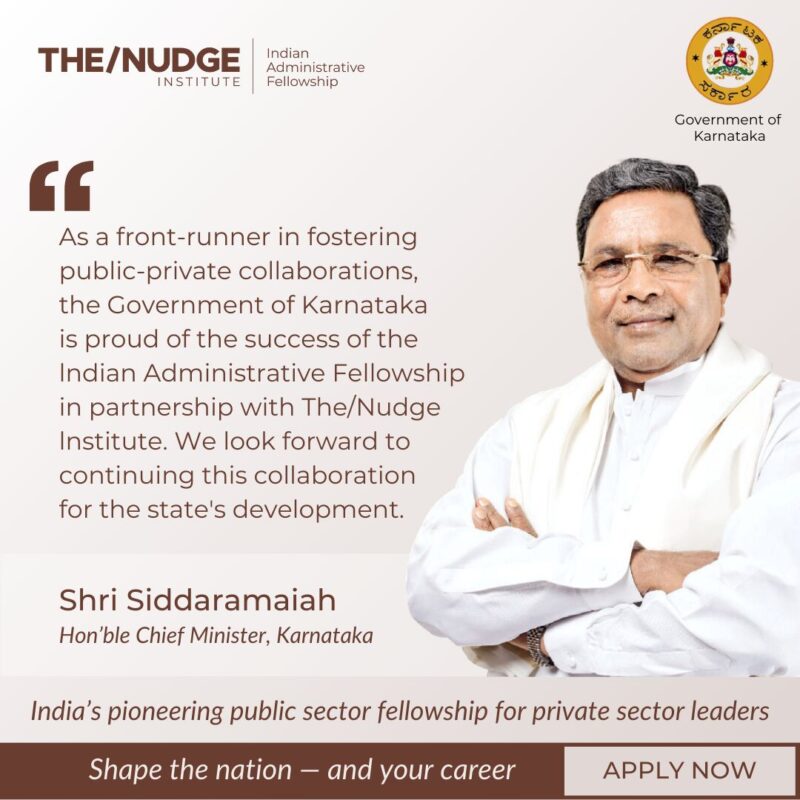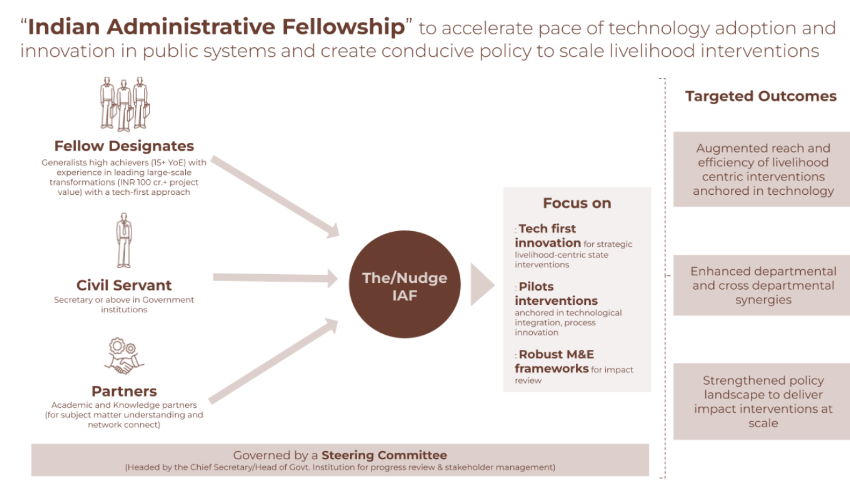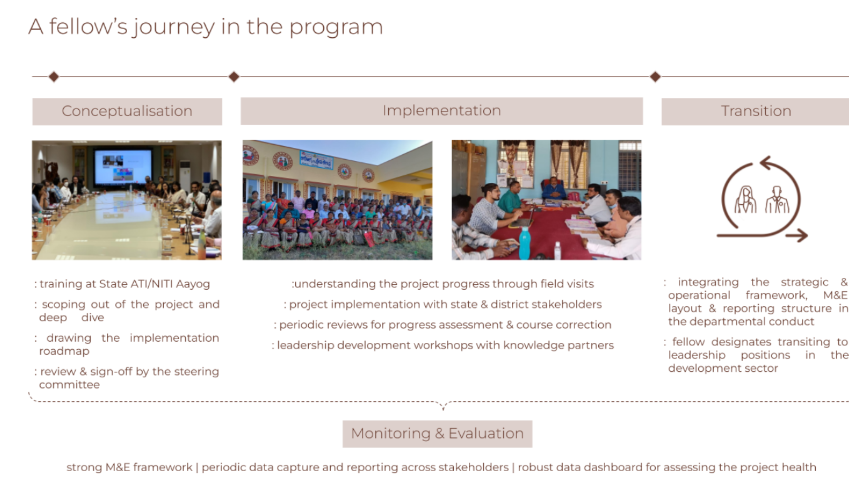The/Nudge Indian Administrative Fellowship in Karnataka: Third cohort

![]()
About The/Nudge
NUDGE LIFESKILLs FOUNDATION (The/Nudge Institute) is a Section 8 company incorporated under the Companies Act, 2013 with its corporate office in Bengaluru founded in 2015 by Atul Satija with a purpose to alleviate poverty, sustainably and scalably.
The/Nudge Institute is governed by a board comprising of Mr. Arun Seth (Ex-Chairman, British Telecom), Mr. B. Muthuraman (Ex-Vice Chairman, Tata Steel) and advisors such as Binny Bansal (Co-founder, Flipkart), Dr. Devi Shetty (Chairman, Narayana Health) amongst other eminent leaders.
Our Journey, in brief
Over the last 6 years, we have impacted ~16m lives through our direct, leveraged and indirect work across three impact streams:
- The/Nudge Centre for Skill Development and Entrepreneurship (CSDE) – we enable underprivileged youth to lead flourishing lives
- The/Nudge Centre for Rural Development (CRD) – we enable rural families to come out of extreme poverty
- The/Nudge Centre for Social Innovation (CSI) – we nudge and nurture talent to solve for India’s biggest problems
About the Indian Administrative Fellowship
The Indian Administrative Fellowship is an initiative of The/Nudge Institute to augment the capacity of government institutions with senior executives from the corporate sector (Fellows). Each Fellow brings strategic acumen, entrepreneurial drive as well as execution capability to steer large-scale multi-stakeholder programs/initiatives. Fellows
are assigned to work with heads of State departments for an 18-month period on initiatives at the intersection of technology and livelihoods.
The Indian Administrative Fellowship through 18 month cohorts works with government institutions towards unlocking systems transformation by fostering technological integration, process innovation, and a conducive policy landscape
thereby delivering impact at scale.
Impact objectives of the Program
Indian Administrative Fellowship intends to stimulate sustained impact at scale, by bringing together talent from the private sector to collaboratively work with state leadership to:
- accelerate adoption of technological innovation to drive systems change
- amplify impact through focused & collaborative governance
- strengthen departments’ outlook towards innovation & systems thinking
- create avenues for top talent to solve critical problems in the area of livelihoods

Program Design
The Fellowship is designed as an 18-month cohort cycle that will be phased across immersion, implementation & transition, each Fellow designate will graduate across phases considering the departmental framework and pace of progress; but it’s crucial that all Fellow designates cover the three phases in the stipulated 18 month window.
The Fellowship is designed to focus on building capacity for the Fellow designates through periodic leadership boot camps delivered by premium institutional partners, alongside periodic huddles within the cohort to inculcate and promote peer-learning.
The Fellow Designates will also gain access to mentors including retired IAS officers and leaders who have worked on transformative projects with the government.

Phase /Significant tasks
Immersion
- Onboarding and induction to departmental programs, stakeholders, and priorities.
- Clearly defining the scope of the engagement wrt which areas to cover for assessment and framework design and the departmental stakeholders to actively coordinate with.
- Drawing a roadmap including milestones, progress indicators for the rest of the Fellowship duration with outputs and timelines aligned across stakeholders.
Implementation:
- Building understanding and sketching an assessment landscape across different areas as agreed in the scope say technology integration, data management, process optimization, and potential for collaboration.
- Interacting with stakeholders (state, districts) to capture perspectives on existing processes & systems, significant gaps, and potential improvements sought.
- Deliberating and establishing frameworks, best practices, enhanced systems, and processes to enable resource
optimization, accountability, and transparency to strengthen citizen service delivery and welfare. - Piloting the proposed framework in a district or a cluster of districts to identify acceptance and effectiveness; also capturing feedback for improvements.
- Documenting regular updates as part of the engagement review and reporting frameworks.
Transition :
- Documenting the frameworks, processes, systems established and piloted, in parallel having it integrated as part of
departmental conduct with established owners in order to sustain the effectiveness of the Fellowship intervention. - Spotlighting the Fellow’s work and initiating introductions for outplacements support through program partners.
The Indian Administrative Fellowship Team
The Indian Administrative Fellowship team is divided across two sub-teams, the program team, and the cohort team. The program team focuses on the overall design, partner onboarding and management, while also working with the cohort team on aspects of monitoring & evaluation and research & advocacy. The cohort team comprises the State Head and State Leads who work closely with the Fellows on their engagements.
Stakeholders and Charter
- The Fellowship builds convergence and collaborations across multiple stakeholders within the government institutions and beyond.
- The key stakeholders of the program and their commitments to the program include:
Program Sponsor at the government institution (usually Additional Chief Secretary, Principal Secretary)
- Onboard all the project advisors/department heads to participate in the program.
- Engage and provide support to Fellow designates and Project Advisors on engagement progress and oversight through quarterly and ad-hoc reviews.
- Mentor/advice on areas of intervention, gaps, priorities, and potential partnerships for the engagement.
Project Advisors (Additional Chief Secretary/Principal Secretary/Admin Secretary, with a strong belief in the program’s theory of change and clearly defined projects to be executed):
- To identify the department or sub-department and the areas to assess and augment capacity through the Fellow designate’s engagement, and set clear goals and the pace of progress, for the period of the engagement.
- To provide guidance, mentoring and resources to the Fellow designates, by working closely and helping them to achieve strategic clarity and understanding of problems, public systems as well as approaches to the solution.
- To provide feedback and direction in a timely manner, assist with guidance on administrative and procedural compliances, and remove roadblocks as necessary to enable the Fellow designate’s success.
- Participate in the monitoring and evaluation process to present project progress along with Fellow designates through quarterly review sessions and regular report submissions.
Project Directors (Operational partners with whom the Fellows will be working closely Commissioners/Mission Directors)
- To support the Fellow in exposing them to opportunities/stakeholders/program based on internal needs and priorities
- To set clear expectations, goals, and the pace of progress, for the period of the engagement
- To provide feedback and direction in a timely manner and assist with administrative and procedural compliances as required
- To manage the travel arrangements/reimbursements for the official visits as part of the project
- To participate in the monitoring and evaluation process to present project progress along with the Fellows either in compiling updates, reports or review and Steering Committee meetings
High power Steering committee (composition of the committee varies on state to state basis, but includes the government institution/state leadership including program sponsor and a couple of project advisors and The/Nudge leadership):
- To provide administrative oversight through periodic reviews to the program across all Fellow engagements by reviewing project scoping and progress, conflict management and advising on crucial engagement specific aspects/concerns.
The/Nudge Indian Administrative Fellowship team:
- Facilitate leadership bootcamps, training, workshops, seminars to build the capacity of the Fellow designates and broaden their exposure to emerging solutions and innovations in the social sector.
- Provide mentorship avenues for the Fellow designates on specific needs.
- Manage expectations across all the program stakeholders.
The Karnataka Cohort – KA/21
The Indian Administrative Fellowship kicked off with its inaugural cohort (KA/21) with the Government of Karnataka in July ‘21, where we onboarded 10 Fellow designates with a distinguished career as leaders, working with visionary civil servants across 10 departments to deliver needle-moving change through their engagements.
Fellows worked on key departmental priorities and projects infusing into the work, ideas, innovation, efficiency and technology. Their contributions have resulted in creation of technology frameworks in Women & Child Development, Go to market strategies and brand creation for FPO produce and Agritech innovations for farmer beneficiaries among others.
The Punjab Cohort – PB/22
The second cohort – Punjab ’22 (PB/22) was kicked off in collaboration with the Government of Punjab in December last year. 10 spirited senior professionals with a strong intent to serve & average 22 years of experience in Tech, Product, and Business Transformation, will be working with Visionary Civil Servants on strategic priorities for the State of Punjab inc. Agriculture, Employment Generation, Industries and Commerce, and Finance, amongst other critical focus areas.
Application & Selection Process
The application form for the cohort would be available on the website – here. If the candidate is not keen to apply for the current cohort, one can consider registering their interest on the website – here.
The selection process would span across 3 stages:
Stage 1 :: Initial screening on the basis of the application form and other submissions.
Stage 2 :: Interactions with The/Nudge leadership team and partners including serving
or retired senior IAS officers, experts in the public leadership space.
Stage 3 :: Interaction with ACS/PrS/Dept Head/Selection committee.
Who can be a Fellow?
The profile of a Fellow is that of :
- High achiever in the technology domain with 15+ years of achievement and capabilities in problem-solving, influencing, negotiation, perseverance in ambiguity, and leading large initiatives with successful outcomes.
- A candidate who has a relentless drive to provide sustainable and scalable solutions for India’s wicked problems through innovation, persistence, and alliance.
- An applicant with fluency (spoken & written) in the local language of the state wherein the cohort is being hosted will be at a distinct advantage.
What do we offer as part of the Fellowship?
The Fellowship offers a platform to stimulate systems change by infusing talent & innovation to deliver large-scale impact through the power and network of public leadership. The program offers the candidates an unparalleled opportunity to design and deliver interventions in the governance sphere to strengthen the reach and efficiency of public service delivery.
Beyond the opportunity to lead a large-scale transformation in the governance ecosystem, the Fellowship also offers:
- Leadership development opportunity: The Fellows shall be undergoing an extensive curriculum curated to build capacity for efficient comprehension, formulation and execution of programs/projects.
- Access to an expert advisory and mentor panel: The Fellows will be mentored and supported by a pool of subject matter experts, industry leaders and mentors.
- Stipend : Each Fellow will receive a stipend of upto Rs. 12 lacs p.a. for the duration of the Fellowship.
- A team of young professionals: As part of the Fellowship, the Fellows will have access to a pool of young talent with diverse skill sets supporting them on secondary research, governance and capturing reports.
- Impact showcase and accreditation: During the course of the Fellowship the Fellow’s contribution would be spotlighted through media features & case studies. There would also be a ceremony featuring senior administrators, notable leaders from the development sector, and other corporates with a formal accreditation by the government.
What are the expectations?
The Fellowship is designed to be a rigorous experience of learning and steering transformational initiatives in the public leadership realm. The program stakeholders, including the Project Advisors, Project Directors have pivotal roles and responsibilities in working with the Fellows to steer the needle-moving change during the duration of the engagement, there are clear expectations laid down for the Fellows as well.
On departmental engagements:
- To understand, propose, and formulate the framework and strategy for the particular engagement.
- To seek and build clarity, collaboration, and consensus across stakeholders for carrying the engagement forward.
- To communicate status updates, seek feedback, and refine, or course-correct, as needed to achieve success on parameters, agreed with the Project Advisor.
- To deliver on aligned goals in coordination with the department with a high sense of ownership and accountability; also ensuring the delivery of a pilot to establish evidence on. the intervention effectiveness
On knowledge management:
- To document the research, key deliberations and decisions, and data on a regular basis, which can be leveraged by the teams working in the current cohort and for subsequent cohort learning as well.
- To participate and contribute in all workshops, seminars, and bootcamps by sharing perspectives and learning from peer experiences.
On advocacy and research engagement:
- To engage with organizations/institutions/departments of the state to catalyze the impact of the Fellow’s engagement.
- To carve out research areas beyond the ones that have a high level of intersection with Fellow’s work along with the program team and engage to provide perspective, access to information, and program stakeholders.
On monitoring & evaluation:
- To provide regular updates on the progress of the engagements; along with regular documentation on scoping, stakeholders, and progress through reports and dashboards.
- To deliberate with the department stakeholders to design a framework including indicators for mapping the progress and contribution of the Fellow’s work in the departmental engagement(s); also regularly updating the data and sharing with the program team and M&E partner department within the government.
On working with the IAF team:
- To set clear expectations regarding the division of responsibilities & ways of working with the team members toward making swift progress on the engagements.
- To communicate in a timely and consistent manner.
Other Program-Related FAQs
Q. 1 For whom is the Fellowship, not a good fit?
The Fellowship is an 18-month rigorous program on framing and executing state-wide government programs of strategic relevance under the guidance of visionary civil servants leading the department. A Fellow will be stationed at the secretariat/ relevant department office, but one would be expected to travel frequently and on short notice
during the Fellowship.
The target Fellow profile is that of a CXO/VP/GM in a large scale organization, with rich experience of leading transformational programs.
The program is not a good fit for someone :
- who is a non-resident Indian, although OCI cardholders who are regular taxpayers can consider applying
- who has less than 10 years of experience in leading transformational initiatives
- who is not comfortable with working 6 days work weeks, traveling or working in the field, committing full-time to the assignment
- who lacks the leadership experience required for such large scale initiatives
Those who don’t match the Fellow profile can explore other exciting opportunities in the program team here.
Q.2 What happens post the Fellowship?
The Fellows will receive soft support to transition into suitable roles within the development sector.
Q.3 What would be the Fellow’s position in the government?
All Fellows would be Indian Administrative Fellows (Fellows) with the government but the formal engagement shall be as a Consultant with The/Nudge.
Q.4 What happens if the civil servant/department head gets transferred or the project is halted/terminated?
The Fellow is linked to the department, so even if the department head gets transferred, the Fellow shall remain on the project assigned and will be working subsequently with the incumbent official. Although all the projects selected are
approved and funded ones, in case a project gets terminated, the Fellow will start engagement on a different project for the remaining part of the program after deliberation with the project advisor.
Q.5 How much travel should one expect during the Fellowship?
The Fellows will be based out of the city their secretariat/department offices are located in, but in order to understand deeper aspects of the project and to facilitate implementation, one would need to travel across districts where the project will be or is being implemented. The frequency of travel would depend on the nature of the department & focus of the projects.
Q.6 What happens if a Fellow has to leave the project mid-term?
The Fellows will be signing a contract to serve for a period of 18 months. However, if unavoidable circumstances require an early termination, they will be required to serve a notice period of 2 months, or reimburse for the stipend in lieu of the notice period.
For more information on the program – https://iaf.thenudge.org/
In case of doubts, concerns, or clarifications; write to us at iaf@thenudge.org

